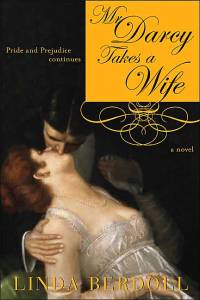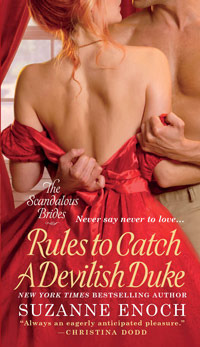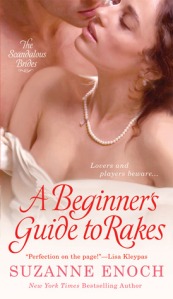Title: The Care and Taming of a Rogue  (Adventurers’ Club #1)
(Adventurers’ Club #1)
Author: Suzanne Enoch
Length: 371 pages
Genre: historical romance
New or Re-Read? Re-Read
Rating: 3.25 stars
I don’t like monkeys.
I should just say that from the outset, because the monkey is, well, not an insubstantial part of this book. It’s meant to be endearing, but I find monkeys just inexpressibly creepy. (Now if it had been a lemur, we could’ve talked).
That said, I think I liked this book better on the second go than I remember liking it the first time I read it. That still isn’t a resounding acclamation, mind you, but I felt less distracted while reading than I did the first time. Enoch’s Adventurers’ Series explores the lives of men who have come back from Britain’s imperialist expeditions rather the worse for wear. It’s a fairly good inversion of the cheerful “Rule Britannia” trope. Of course, the focus is still on the effect these things have on the white British people rather than on the conquered, but, you can only expect so much multi-cultural awareness from Regency romance novels, really. Enoch takes a lot of inspiration from actual historical figures, and it does allow her to explore a different section of society than you see in a lot of typical books of this kind.
So. In Book One, Captain Bennett Wolfe returns from an African expedition where his second, David Langley, left him for dead. Langley stole Bennett’s journals and published them under his own name — but with a few revisions that made Bennett look like a bumbling idiot and Langley like a great hero. When Bennett returns from the Congo to find his reputation in tatters, he sets his sights on revenge — but his temper and disregard for polite society’s rules aren’t helping him win his case.
He has a few allies, and among them is Phillipa Eddison, called Flip, an determined bluestocking. Flip has read his previous books and is willing to believe that Langley is perpetrating a deceit upon the public. Unfortunately, Bennett keeps getting distracted by his growing lust and admiration for Flip, and since he’s spent most of his adult life outside of polite society, he takes actions that are decidedly too forward. Flip chastises him for overstepping boundaries, but then spends most of the book doing a really poor job of teaching him better manners. And he’s not helped by the fact that he brought home a monkey who gets into all sorts of screwball-comedy shenanigans.
The biggest problem with this book (apart from the monkey) is that neither of the main characters are tremendously likeable. Flip does do a little too much of the “I read books and think sensibly and therefore that makes me better than Other Girls” thing, a trope which I’m finding increasingly annoying in historical romances. Being a bluestocking doesn’t have to mean looking down your nose at girls who aren’t (I should know). It isn’t egregious, and Enoch does show that she has female friends and isn’t quite as much of an intellectual recluse as she seems to think herself, which mitigates it somewhat. Bennett, who is supposed to be barely civilised, mostly just comes off as unnecessarily aggressive and a bit of a boor. He makes half-hearted attempts at appropriate courtship, but considering that Flip never actually enforces her supposed ideals about propriety. Their romance is more a collision than anything else, which keeps the book clipping along, but which doesn’t make a lot of intrinsic sense, nor does it have the ring of emotional authenticity. Flip has to help Bennett restore his reputation, but the actual conflict between the two of them — his desire for adventure versus her homebody-ness — is never really addressed, but rather hand-waved so that they can get to the HEA.
So — I would call this a thoroughly middle-of-the-road romance novel, good brain candy, but not outstanding. Not Enoch’s best work, but not painful to read, either.














You must be logged in to post a comment.